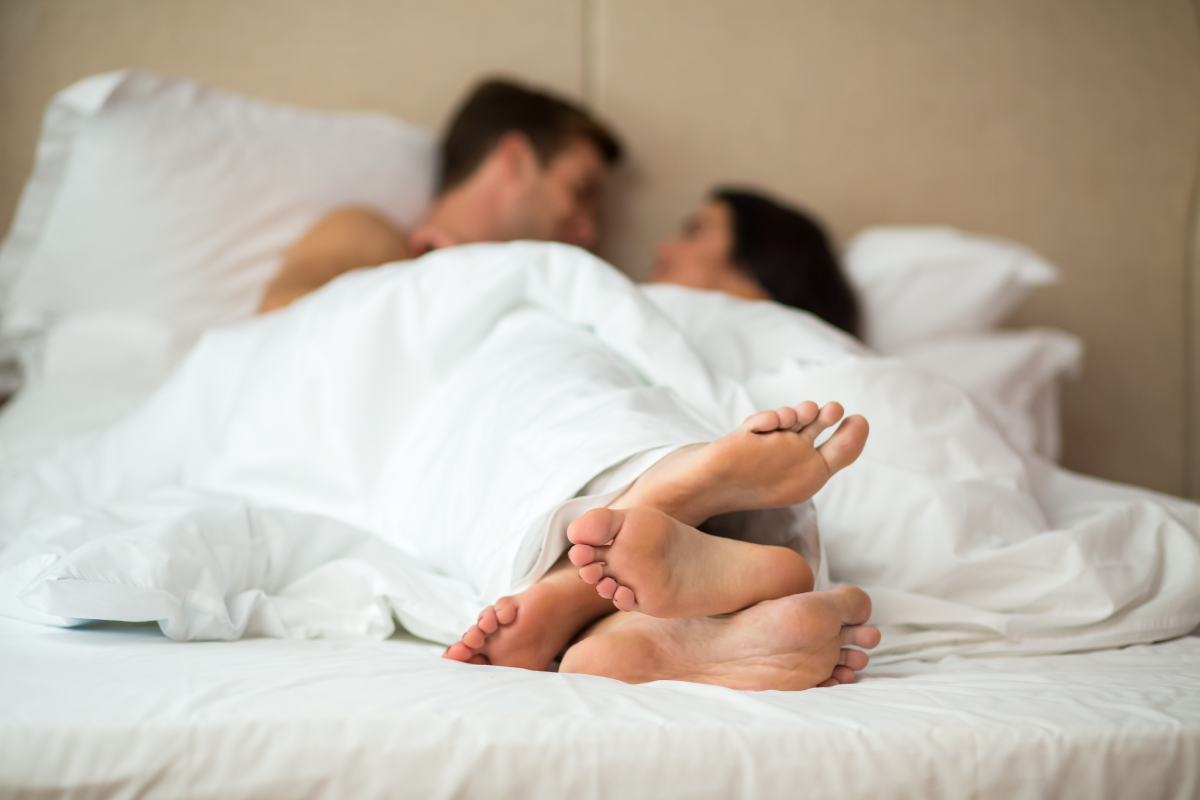
Achieving the big O can be elusive for women, even at the best of times.
But for those who have gone through menopause, it can become a much bigger concern.
Many women worry about the impact this life stage will have on their sexuality, wondering if it’s still possible to enjoy sex or even reach orgasm.
For Menopause Awareness Month, we thought it was the ideal time to explore the truth behind this concern and clear up a few of the myths when it comes to menopause and sex.
So, can you orgasm after menopause? Keep reading to find out.
Unsurprisingly, there are many misconceptions around this topic.
But spoiler alert: Yes, you absolutely can have orgasms both during and after menopause.
However, that doesn’t stop women from being concerned about this issue as they begin to reach this stage of life.
Understanding Changes in Your Sex Drive
While orgasms are still very much possible (and enjoyable) after menopause, changes in your sex drive or libido are common and can be challenging. Many women notice a decrease in sexual desire during this phase of life.
This can affect not just their relationship with their partner but how they feel about themselves. However, with time and the right approach, it’s possible to enjoy a deeply satisfying sex life and continue experiencing orgasms long after menopause.
What Exactly Is Menopause?
Menopause is marked by the absence of periods for 12 consecutive months, signifying the end of your reproductive years. Before this, women enter perimenopause, a transitional phase where hormone levels begin to fluctuate.
Menopause typically occurs between the ages of 45 to 55, although it varies for each person. During this time, you’ll experience both physical and emotional changes as your levels of oestrogen and progesterone naturally decline, leading to symptoms such as hot flashes, mood swings, and changes in your sexual desire and arousal.
The decrease of oestrogen is what causes most of your menopausal symptoms. There are plenty of misconceptions about menopause and its effect on women’s sexuality, which make navigating this phase even more difficult.
But let’s clear the air: sex after menopause doesn’t have to be bad. In fact, it can still be incredibly enjoyable.
So, where does this notion of bad sex and wondering ‘can you orgasm after menopause’ come from?
Well, there are several reasons for it, which include both physical and psychological changes that happen once you enter menopause.
The Physical Changes
Firstly, let’s talk about the physical side.
As you go through menopause, your oestrogen levels drop as your menstrual cycle stops, and your ovaries no longer produce the hormone. This loss of oestrogen can cause vaginal dryness, which can make sex uncomfortable and therefore harder to reach orgasm.
This decrease in hormones also thins your vaginal wall and urethra, which can cause irritation and pain during sex, incontinence, and even lead to more frequent UTIs, which isn’t exactly great if you are trying to get in the mood.
Additionally, as oestrogen levels fall, blood flow to the vagina and clitoris decreases, leading to reduced sensitivity. This is what leads many women to ask – can you orgasm after menopause?
But it is not something you should worry too much about. All it means is reaching orgasm may take a bit more effort or time, but it’s certainly still achievable. Exploring new techniques or introducing more foreplay can make all the difference.
The Emotional Impact
Menopause doesn’t just affect how sex feels but how much you desire it too. Aside from physical discomfort, symptoms like fatigue, mood swings, and hot flashes can all put you off wanting to have sex.
But that’s not all.
Testosterone plays a major role in a woman’s libido. As you go through menopause and beyond, much like your other sex hormones, testosterone levels decline, which has a direct effect on your sex drive.
If you find your libido isn’t what it used to be, it’s important to remind yourself that this is a common experience. One that you should not feel ashamed or embarrassed about.
Negative self-talk or worry over the situation can have a big impact on your self-esteem and mental wellbeing. This, in turn, can further diminish your desire for sex and make reaching orgasm all the more difficult.
Remember that just because your sex life may have changed doesn’t mean that you can’t have great sex, it may just take a slightly different approach.
Tips for Achieving Orgasms After Menopause
If you have gone through menopause, here are some tips on reaching the big O:
- Use lubricant
Regardless of whether you are going through menopause or not, lubricant is a great way to enhance your pleasure and comfort during sex. But for those experiencing vaginal dryness, it is simply a must.
- Pelvic floor exercises
As we go through menopause, many of us can experience incontinence or urinary leakage, which can have an effect on our sex life.
Pelvic floor exercises like Kegels strengthen your pelvic floor muscles to help alleviate this issue. They also improve blood flow to your vagina to help increase your arousal, and the strengthening of these muscles can even improve the intensity of your orgasms.
- Embrace new techniques
If you are experiencing pain or discomfort during sex, or you are finding it hard to become aroused, then experimenting with different forms of intimacy is an excellent way to counteract this.
Exploring non-penetrative forms of sex and intimacy like kissing, oral sex, and using sex toys are all ways to awaken your arousal and achieve orgasm in a way that’s comfortable.
- Communication is key
Openly communicate with your partner about your needs and any changes you’re experiencing to ensure that you’re both comfortable and on the same page. This openness can ease any tension, help you relax, and make reaching orgasms much easier and more enjoyable.
Consider Bioidentical Hormone Therapy (BHRT)
Menopause is caused by the natural decline in sex hormones such as oestrogen, progesterone, and testosterone.
Many women find relief from their menopause symptoms through bioidentical hormone replacement therapy (BHRT) to restore hormonal balance to their bodies and get back to feeling like themselves again.
There are different types of hormone therapies, so it’s essential to do your research and find one that works for you.
Remember that reaching orgasm isn’t the be-all and end-all. Having that as the main goal every time you have sex can be counterproductive, so relax, enjoy the ride, and you are far more likely to get there in the end.
How The Marion Gluck Clinic Can Help
At our hormone clinic, we offer personalised bioidentical hormone replacement therapy (BHRT) specifically designed for women who have gone through menopause.
As pioneers of BHRT, we offer a more natural alternative to synthetic HRT, as it is derived from plants that are chemically identical to hormones found in your body.
We also use compounding pharmacies, which means that your prescription is a custom-made dosage rather than a one-size-fits-all approach. This allows for more targeted treatment of specific symptoms and is tailored specifically for you.
“When it comes to sex and your libido, it’s not just about treating the physical symptoms, as arousal is a lot more complex. We take a highly holistic and integrated approach to help you feel better.
We take the time to understand you, your journey, and what you want to achieve with your hormone treatment, and work with you to get there. Not only through our expert bioidentical hormone therapy but with lifestyle advice and support too.”
If you are struggling with your sex drive following menopause, we are here to help. Book an online appointment with us now and start your treatment journey to reclaim your sexuality, wellness, and confidence.



